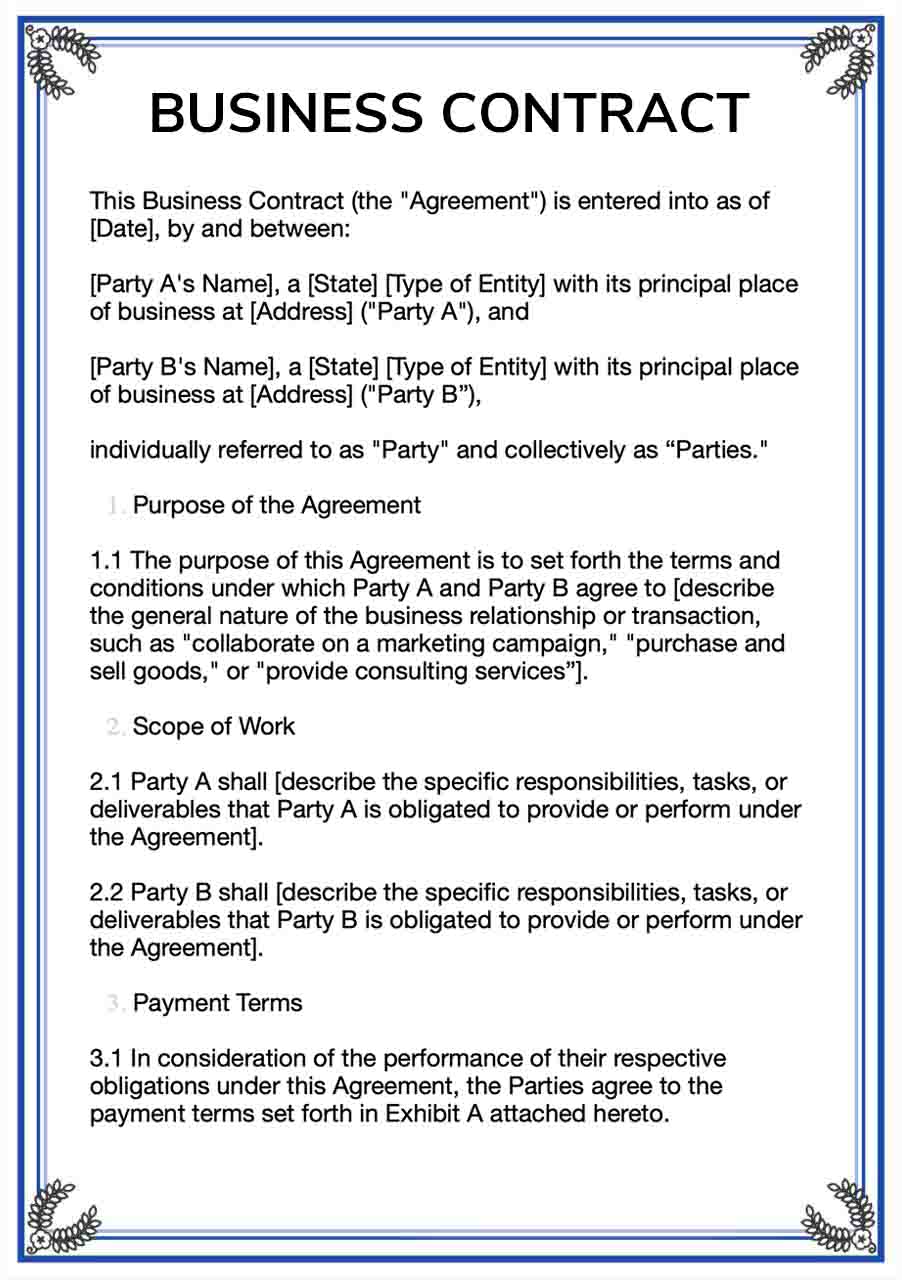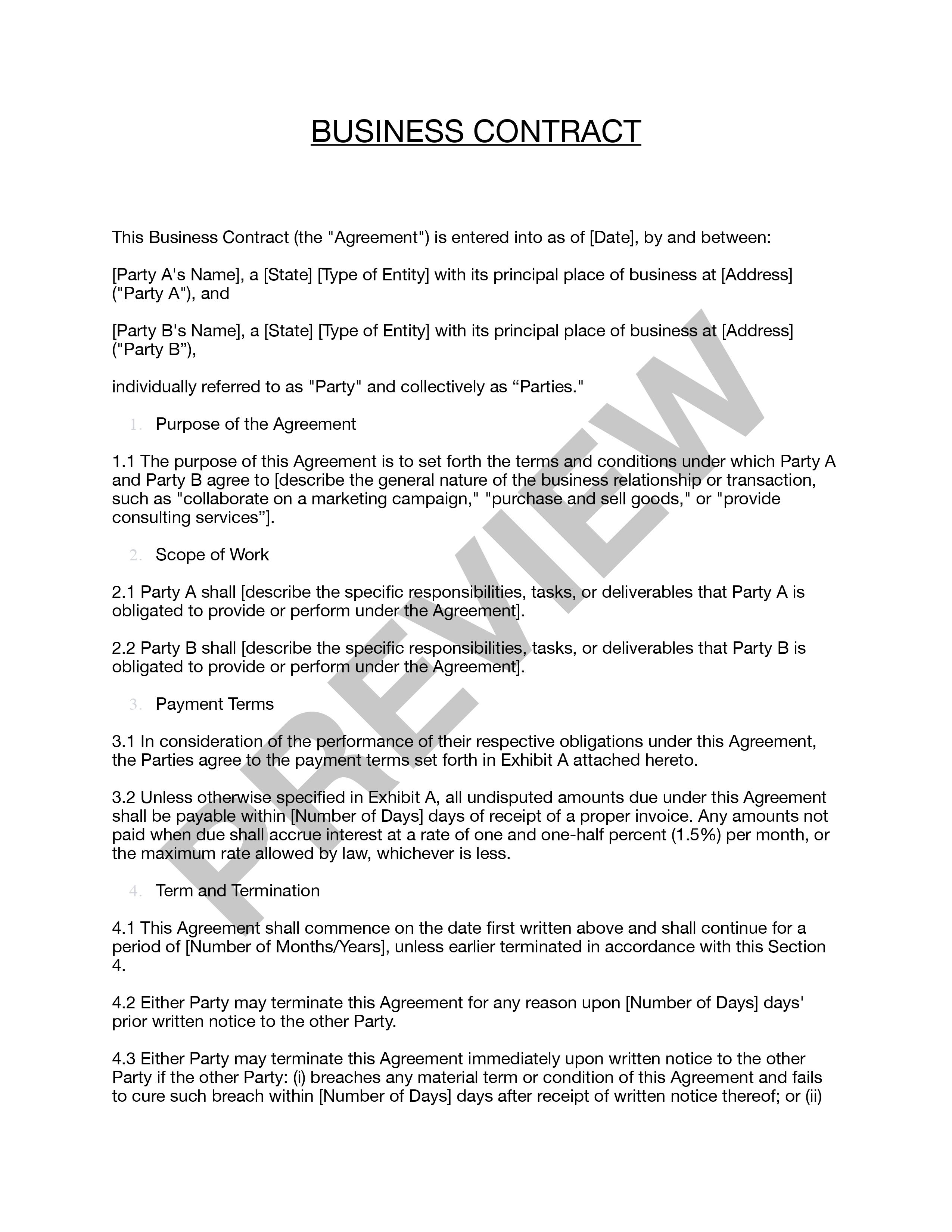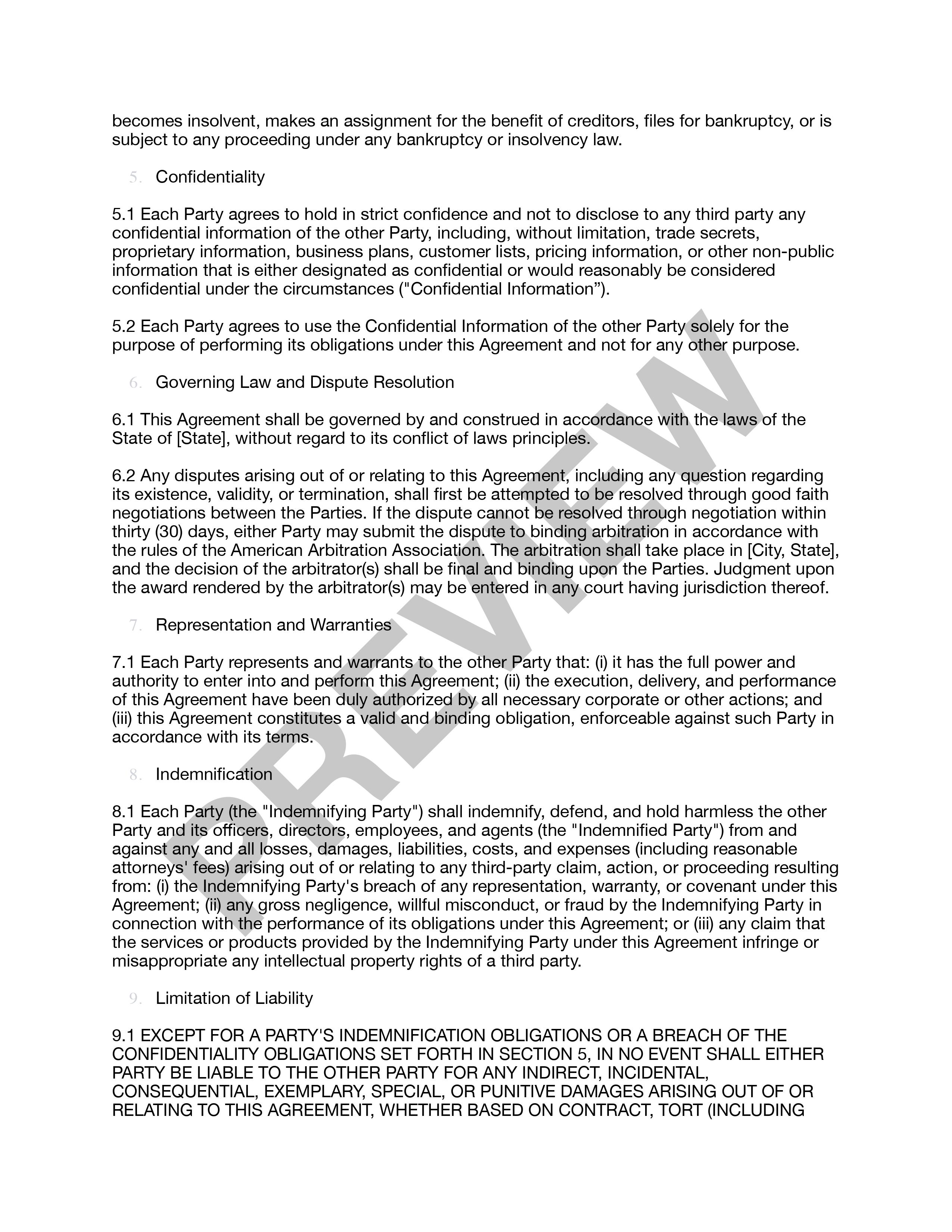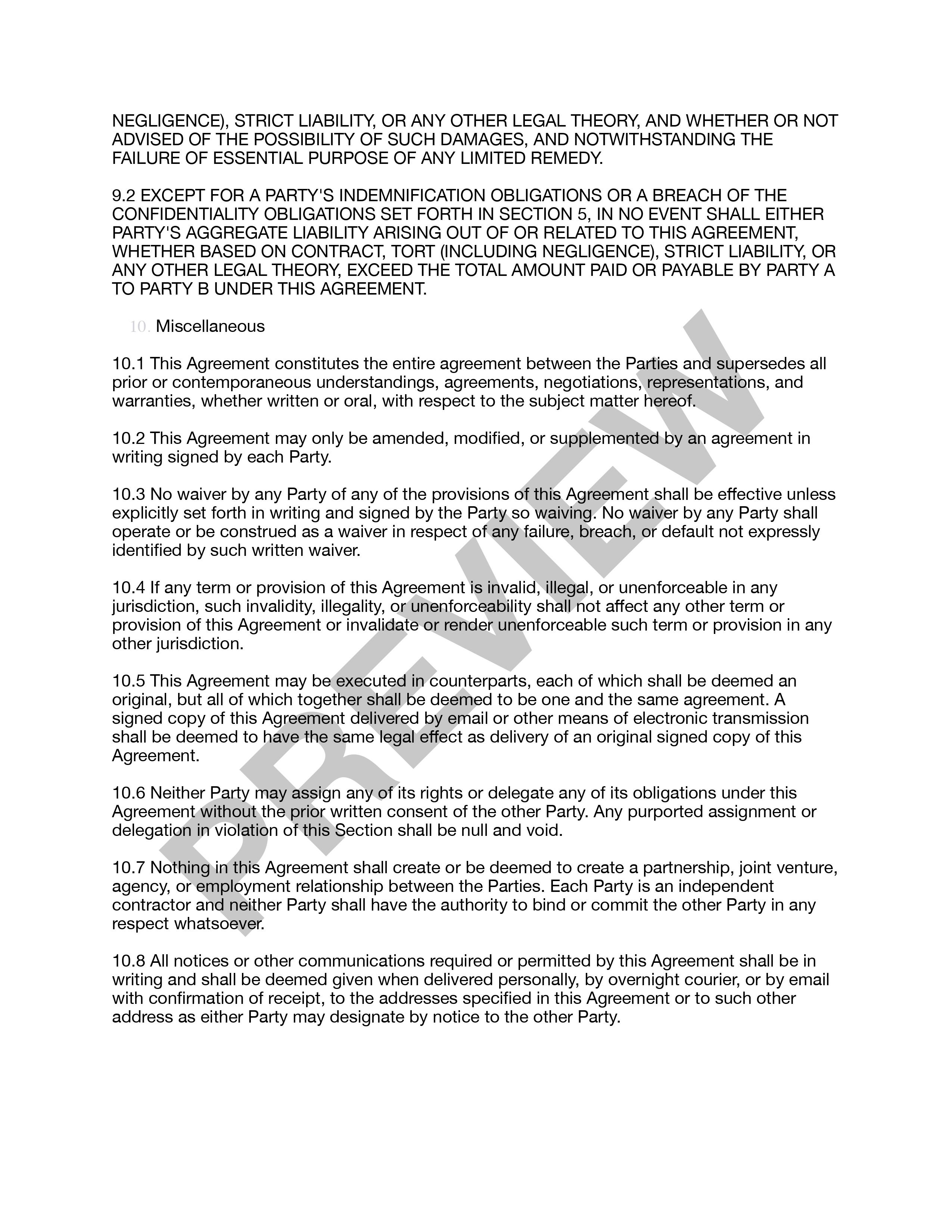Last Updated February 2023
What is a Business Contract?
A business contract is a legally binding agreement between two or more parties that outlines the terms and conditions of a business relationship, transaction, or arrangement. The purpose of a business contract is to establish the rights, responsibilities, and obligations of each party, as well as to set forth the terms for payment, performance, dispute resolution, and other important aspects of the relationship.
Business contracts can cover a wide range of business activities, including but not limited to:
-
Sale or purchase of goods or services
-
Partnership agreements or joint ventures
-
Lease or rental agreements
-
Employment or independent contractor agreements
-
Confidentiality or non-disclosure agreements
-
Licensing or intellectual property agreements
A well-drafted business contract should be clear, concise, and tailored to the specific needs and circumstances of the parties involved. It should also be in compliance with applicable laws and regulations. It is often advisable to consult with an attorney when drafting or entering into a business contract to ensure that your interests are properly protected and that the contract is legally enforceable.
Why are business contracts important?
Business contracts are important for several reasons, as they help establish a clear understanding of the expectations and responsibilities of each party involved in a business relationship or transaction. Some key reasons why business contracts are essential include:
-
Clarity and Structure: Business contracts provide a clear and organized framework for the terms and conditions of a business arrangement, reducing the likelihood of misunderstandings and disputes.
-
Legal Protection: A well-drafted contract offers legal protection to the parties involved in case of a breach, dispute, or non-performance. It serves as a legal document that can be used as evidence in court if needed.
-
Risk Management: Contracts help manage potential risks by outlining the responsibilities of each party, specifying payment terms, delivery schedules, dispute resolution mechanisms, and other essential provisions.
-
Compliance: Business contracts help ensure that the parties involved adhere to applicable laws and regulations, such as employment laws, consumer protection laws, and intellectual property laws.
-
Enforceability: Written contracts are generally more enforceable than oral agreements, as they provide a tangible record of the agreed-upon terms and conditions.
-
Performance Standards: Contracts can outline performance standards, quality expectations, and other benchmarks to ensure that each party meets its obligations effectively.
-
Relationship Management: A well-structured contract can help maintain a healthy and professional relationship between the parties involved by addressing potential issues, establishing communication protocols, and setting expectations.
In summary, business contracts are crucial for establishing the rights, responsibilities, and obligations of each party in a business relationship or transaction. They provide clarity, legal protection, risk management, and help maintain a professional and healthy relationship between the parties involved.
What are the key elements of a business contract?
A valid business contract typically includes the following key elements:
-
Offer: A proposal or promise made by one party to another, outlining the terms and conditions under which the offering party is willing to enter into an agreement.
-
Acceptance: The agreement by the other party to the terms of the offer, which can be expressed either verbally, in writing, or through conduct, such as starting work or making a payment.
-
Consideration: Something of value exchanged between the parties in the contract, such as money, goods, services, or a promise to perform or refrain from performing certain actions. Consideration is essential for a contract to be legally enforceable.
-
Mutuality of Obligation: Also known as the "meeting of the minds," this element refers to the mutual understanding and agreement between the parties on the contract's essential terms and conditions.
-
Competent Parties: Both parties must have the legal capacity to enter into a contract. This generally means they must be of legal age, mentally competent, and not under the influence of substances that could impair their judgment.
-
Legality: The subject matter of the contract must be legal and not against public policy. Contracts involving illegal activities or violating public policy are not enforceable.
-
Intention to Create Legal Relations: Both parties must intend for the contract to create a legally binding relationship. In business contracts, this intention is usually presumed, but it can be explicitly stated in the agreement.
-
Clear and Certain Terms: The terms and conditions of the contract should be clear, definite, and specific, allowing for the parties to understand their rights and obligations without ambiguity.
By ensuring that these key elements are present in a business contract, parties can create a legally enforceable agreement that clearly outlines their respective rights and obligations, reducing the likelihood of misunderstandings and disputes.
Who should get a business contract?
A business contract should be considered by any individuals, businesses, or organizations that are entering into a business relationship, transaction, or arrangement. This includes, but is not limited to, the following parties:
-
Businesses engaging in the sale or purchase of goods or services, either as a buyer or seller.
-
Service providers and their clients when entering into an agreement for the provision of services.
-
Employers and employees when establishing the terms and conditions of employment, including compensation, benefits, and job responsibilities.
-
Independent contractors and businesses hiring them to perform specific tasks or projects.
-
Business partners who are forming a partnership, joint venture, or similar business arrangement.
-
Landlords and tenants entering into a lease agreement for commercial or residential property.
-
Parties involved in licensing, franchising, or intellectual property agreements.
-
Shareholders of a company when establishing the terms of their relationship, decision-making processes, and other aspects of company management.
-
Individuals or entities entering into confidentiality or non-disclosure agreements to protect sensitive information.
-
Parties entering into non-compete agreements or other restrictive covenants.
In general, anyone engaging in a business relationship or transaction that involves the exchange of value, the provision of goods or services, or the establishment of rights and obligations should consider using a business contract to clearly define the terms and conditions of the relationship, protect their interests, and reduce the risk of disputes or misunderstandings.
Frequently Asked Questions
Disputes arising from a business contract can be resolved through various methods, depending on the preferences of the parties involved and the nature of the dispute. Some common methods for resolving business contract disputes include:
-
Negotiation: The parties involved can attempt to resolve the dispute through direct communication and negotiation. This approach is often the simplest and most cost-effective way to resolve disagreements, as it allows the parties to find a mutually acceptable solution without involving third parties or resorting to formal legal proceedings.
-
Mediation: Mediation is a voluntary, informal process in which a neutral third party (the mediator) helps the disputing parties reach a mutually acceptable resolution. The mediator does not make decisions or impose a solution but facilitates communication and assists the parties in identifying common ground and potential solutions.
-
Arbitration: In arbitration, a neutral third party (the arbitrator) is appointed by the disputing parties or selected from a panel to hear the arguments from both sides and make a binding decision. Arbitration can be faster and less expensive than litigation, and the parties can choose to keep the proceedings confidential. Arbitration clauses are often included in business contracts to specify that disputes should be resolved through this method.
-
Litigation: If the parties cannot resolve their dispute through negotiation, mediation, or arbitration, they may choose to take the matter to court. Litigation involves a formal legal process where a judge or jury hears the case and makes a binding decision. This method can be time-consuming and expensive, and the proceedings are generally public.
-
Collaborative Law: This is a less common but emerging method of dispute resolution, where both parties and their respective attorneys commit to resolving the dispute without going to court. The parties work together to find a mutually acceptable solution, and if they cannot do so, the attorneys involved must withdraw from the case, and new counsel must be retained for litigation.
The preferred method for dispute resolution is often specified in the business contract itself. In some cases, the parties may start with negotiation or mediation and escalate to arbitration or litigation if a resolution cannot be reached. It is essential to consider the advantages and disadvantages of each method when drafting a business contract and to seek legal advice if a dispute arises.
A breach of contract occurs when one party fails to fulfill its obligations under the terms and conditions of a valid and enforceable business contract. In other words, it is a failure to perform a promise made in the contract. A breach of contract can happen in various ways, such as:
-
Failure to deliver goods or services as specified in the contract
-
Failure to make payments as agreed upon
-
Failure to meet performance or quality standards outlined in the contract
-
Failure to meet delivery or completion deadlines specified in the contract
-
Failure to comply with other contractual obligations or provisions.
When a breach of contract occurs, the non-breaching party may have various legal remedies available, such as seeking damages, specific performance, or termination of the contract. The appropriate remedy depends on the nature and extent of the breach and the specific terms and conditions of the contract.
It is important to note that not all contract breaches are the same, and some breaches may be minor or unintentional. Therefore, before taking any legal action, it is often best to try and resolve the issue through communication and negotiation.
In some cases, a business contract can be assigned to another party, but it depends on the specific terms and conditions of the contract and the nature of the assignment. An assignment is a transfer of rights and obligations from one party (the assignor) to another party (the assignee).
Most contracts contain clauses that address assignment or transfer of the contract. Some contracts prohibit assignment entirely, while others allow assignment only with the written consent of the other party. If a contract does not specifically address assignment, the law in the relevant jurisdiction may apply default rules that govern the assignability of contracts.
If assignment is allowed, the parties may need to follow certain procedures to effectuate the assignment. Typically, this involves notifying the other party of the assignment, obtaining their consent (if required), and executing an assignment agreement that transfers the rights and obligations of the assignor to the assignee.
It is essential to carefully review the terms and conditions of the contract and seek legal advice before attempting to assign a business contract to another party, as failure to follow the proper procedures or violate any restrictions on assignment can result in a breach of contract or other legal consequences.
The duration of a business contract can vary depending on the nature of the relationship or transaction and the preferences of the parties involved. Generally, the length of a business contract is determined by the following factors:
-
Purpose: The duration of the contract should be sufficient to achieve the purpose of the agreement. For example, a contract for a specific project may have a fixed term that ends upon completion of the project, while a contract for ongoing services may be open-ended with a termination clause that allows either party to end the agreement with notice.
-
Industry Standards: The duration of the contract may be influenced by the practices and standards of the industry in which the parties operate. For example, contracts in the construction industry may have longer terms than contracts in the technology sector.
-
Market Conditions: The duration of the contract may be influenced by market conditions, such as fluctuations in supply and demand or changes in economic conditions. For example, a supplier may prefer longer contract terms to ensure a steady stream of business, while a buyer may prefer shorter terms to maintain flexibility and control over their purchasing decisions.
In general, the parties to a business contract should agree on a duration that provides a reasonable balance between their respective interests and the purpose of the agreement. Contract terms can range from a few months to several years, with options for renewal or extension if both parties agree. It is important to consider the potential risks and uncertainties that may arise over the contract's term and include appropriate provisions to protect the parties' interests, such as termination clauses, change-of-control provisions, and dispute resolution mechanisms.
Not having a business contract can lead to various negative consequences for the parties involved. Some of the consequences include:
-
Unclear terms and conditions: Without a business contract, there may be no clear agreement on the terms and conditions of the business relationship, transaction, or arrangement. This can lead to misunderstandings, disagreements, and disputes, which can be costly and time-consuming to resolve.
-
Lack of legal protection: A business contract provides legal protection to the parties by outlining their rights and obligations, as well as specifying the consequences of breach or default. Without a contract, the parties may be left without legal recourse if one of them fails to fulfill their obligations.
-
Difficulty in enforcing obligations: Without a written agreement, it may be difficult to prove the existence and terms of the business relationship, transaction, or arrangement. This can make it challenging to enforce obligations or seek remedies for breach or default.
-
Missed opportunities: A business contract can help parties take advantage of business opportunities, such as securing financing, entering new markets, or expanding their operations. Without a contract, parties may miss out on these opportunities or find it more difficult to pursue them.
-
Increased risk: Without a business contract, parties may face increased risk and uncertainty, as they may be exposed to unexpected costs, liabilities, or disputes. This can affect their financial stability and reputation in the marketplace.
In summary, having a well-drafted and enforceable business contract is essential for protecting the interests of the parties involved, reducing the risk of disputes and misunderstandings, and maximizing the potential benefits of the business relationship, transaction, or arrangement.




